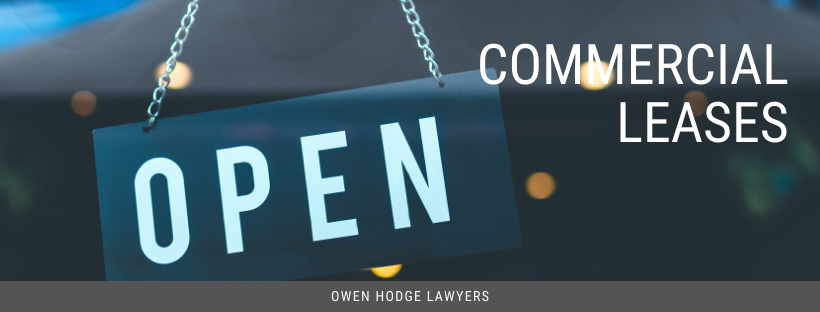It is important to know the ins and outs of commercial lease agreements before signing on the dotted line.
A commercial lease agreement is a contract between a landlord and a business for the rental of property. Most businesses will choose to rent property instead of buying it because it requires less capital. A commercial lease is a legally binding document, therefore before signing, it is important to obtain business legal advice so that you understand the lease contract that defines the rights and responsibilities of each party.
Here are the main issues to consider when drawing up a contract to lease commercial property.

Things to consider when entering into a commercial lease
As we mentioned, a commercial lease agreement is a legally binding contract. Therefore when considering the below factors, keep in mind that any actions that fail to meet the terms of the legal agreement may require dispute resolution and the assistance of a commercial litigation lawyer.
Term of lease and option to renew lease
The duration (or ‘term’) of the lease is very important to consider when negotiating a commercial lease agreement. The physical location of a business may be particularly important if it is a retail outlet or your business requires a shopfront (e.g. brick and mortar retail shops and small business spaces in shopping centres).
Negotiate flexibility into the term and conditions of the lease to suit your business circumstances. It is also ideal to include an option to renew your lease which is exercised in writing, often between three and six months before the end of your lease.
Rent and rent reviews
The rent and rent reviews are negotiated between the landlord and tenant. Commercial leases usually specify an amount without outgoing costs (see below). Under NSW legislation, there are no regulations to specify rents or the rate of rent increases on commercial premises. However, the law specifies that the timing of those reviews and the basis of reviews must be set out in the lease for each rent review period. This should be clearly set out in your commercial lease contract.
Outgoings or operating expenses
Rent for a commercial lease may be inclusive of outgoing costs, but outgoing costs are traditionally in addition to the lease rent. The lease document is a written agreement of the type of outgoings you will be liable for and the percentage of those operating expenses you are to pay. Similar to residential leases, these outgoing costs for a commercial property may include an additional outlay such as water rates, land tax, management fees, strata or other levies and council tax.
Bond
There are no legislative requirements for a bond under a commercial lease. However, most commercial leases typically include a bond agreement. The amount, the conditions for the use, withholding and repayment of the bond is decided between the tenant and the business renting the property and outlined in the commercial lease agreement. The contract also needs to specify when the bond will be returned to the tenant after the lease has ended and under what circumstances the landlord can withhold funds from the bond.
Fixtures and fit-out
Fixtures and fit-outs are particularly relevant when renting a commercial building that is a retail property. Under current NSW legislation, unless otherwise agreed, tenants generally pay the cost of installing shop fixtures and fittings. When the retail lease has ended, tenants usually remove the fit-out and return the shop to the condition it was in before the lease began. Check that your commercial lease agreement contains an inventory of the landlord’s fixtures and fittings and your right to install and remove fixtures.
Maintenance
The commercial lease agreement should also clearly outline what repairs and maintenance the tenant is responsible for and what is the obligation of the landlord. Often the tenant is responsible for general repairs and maintenance. However, try to exclude structural repairs and capital items from the tenant’s obligations. The lease contract should clearly outline what you require the landlord to be responsible for, such as the roof, common areas like gardens and hallways, air-conditioning and so forth.
Refurbishment
Depending on the length of the lease, refurbishment may be an issue that will need to be addressed in the commercial property contract. Some leases require the tenant to refurbish the premises at regular intervals and while it benefits the tenant’s business, it can also come at a significant cost. Make sure that the lease clearly sets out the nature, extent and timing of the refurbishment and limit this to an agreed time frame with which you feel comfortable.
The above are just some of the main issues to assess when considering entering into a commercial lease. There are however many more matters that need to be considered. For this reason, it’s best to obtain legal advice before making a commitment to a commercial lease.
Please contact our Commercial Lawyers and Accredited Specialists during business hours on 1800 770 780 if you require advice about commercial rental properties and help in drawing up a contract for a commercial lease agreement.
